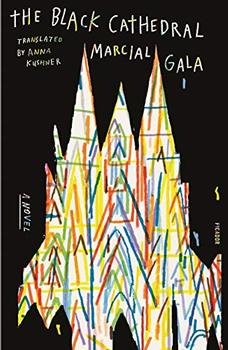Summary | Excerpt | Reading Guide | Reviews | Beyond the book | Read-Alikes | Genres & Themes | Author Bio

Kristopher Jansma's debut, The Unchangeable Spots of Leopards, is an entertaining work of metafiction that explores the boundaries between truth and fiction in storytelling.
Our narrator is a man who has wanted to be a writer since childhood. His determination is solidified in college when he meets the wealthy and talented writing student Julian McGann, and Julian's lifelong friend Evelyn. He develops a deep and lasting friendship with them, and Jansma recounts their interactions and growing reliance on each other using a series of interwoven stories to shed light on their relationships.
A main focus of the plot is the narrator's attempt to write just one perfect novel that will equal or surpass Julian's. Throughout Leopards readers are given pieces of this work-in-progress to peruse during various stages of the narrator's life. The story's setting is always different - sometimes taking place in 19th century New York, for example, while at other times in Imperial Japan - but it's always the same open-ended tale about the unattainable Evelyn. Throughout the various versions are interspersed truths about the three friends' lives and relationships to one another, toying with the lines between fact and fiction, real life and imagination until readers must ask themselves where one stops and the other begins. The stories subtly shift their focus over time, too, reflecting the growing maturity and awareness of their author.
Although readers aren't given the narrator's real name, to call him "unnamed" is incorrect; he's given and assumes many sobriquets throughout the course of the book, including Walter Hartright (in a nod to Wilkie Collins), Outis (Greek for "Nobody" and a reference to the story of Odysseus), and even that of his best friend for a time. It's also wrong to call him a liar; he doesn't so much lie as constantly invent personae for himself, partly in an attempt to belong to a social class that excludes him, partly because he simply doesn't know who he really is. His fabrications are an attempt to establish his identity (the search for identity being another key theme running throughout The Unchangeable Spots of Leopards).
Jansma's writing is rich without being overly dense, eminently satisfying for readers who enjoy well-written prose while at the same time not being so heavy that those looking for a lighter read will find it a slog. It's also very witty, stuffed with literary references that will especially appeal to the bookish set.
My only criticism is that the characters seem a tad too familiar. The plot seemed an overt attempt to be a light-hearted cross between Patricia Highsmith's The Talented Mr. Ripley and F. Scott Fitzgerald's The Great Gatsby. The narrator is certainly more likeable than either Ripley or Fitzgerald's Nick Carraway, but that wasn't enough to divert my attention from the feeling I'd encountered these characters before. Still, Jansma's mind-bending plot and his marvelous writing style justify overlooking this flaw.
Overall Jansma's novel is a debut that shouldn't be missed. Readers who delight in high-quality writing and who enjoy unusually structured novels will find this one a real gem, and I find myself eagerly looking forward to Jansma's next effort.
![]() This review was originally published in The BookBrowse Review in April 2013, and has been updated for the
March 2014 edition.
Click here to go to this issue.
This review was originally published in The BookBrowse Review in April 2013, and has been updated for the
March 2014 edition.
Click here to go to this issue.

If you liked The Unchangeable Spots of Leopards, try these:

by Marcial Gala
Published 2021
Haunting and transcendently twisted, this English-language debut from a Cuban literary star is a tale of race, magic, belief, and fate.

by Liza Klaussmann
Published 2016
A dazzling novel set in the French Riviera based on the real-life inspirations for F. Scott Fitzgerald's Tender is The Night.
Your guide toexceptional books
BookBrowse seeks out and recommends the best in contemporary fiction and nonfiction—books that not only engage and entertain but also deepen our understanding of ourselves and the world around us.